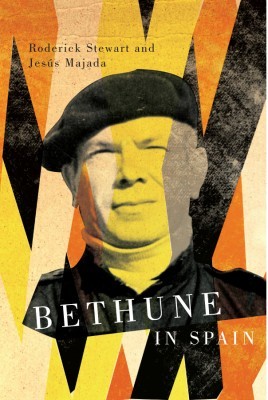“It began in 1931 in Manchuria. The Fascists won that time. Then it got going again in Abyssinia, and the Fascists won again.” In the spring of 1937, as Canada’s Mackenzie King government joined in keeping Republican Spain under effective embargo during the civil war against General Franco and his coup, the Canadian doctor Norman Bethune made the point as clearly as he could: “the world war has started. In fact, it’s in its third stage – Manchuria, Ethiopia and now Spain.”
Bethune had just returned to Canada from the frontline in Spain, and he brought with him vivid firsthand accounts. Like thousands of others from around the world, he had travelled to Spain to join anti-fascist forces in the war triggered by Franco’s July 1936 military insurrection against the Spanish Republic. By the time he returned, Bethune had helped transform blood transfusion infrastructure on the Republican side, had gained the honorary military rank of comandante (major), and had borne witness to some of the worst aerial massacres the world had seen.

Bethune in Spain
Jesús Majada and Roderick Stewart
McGill-Queen’s University Press
$29.95
cloth
186pp
978-0-7735-4383-6
The authors trace the journey that led Bethune from his birthplace of Gravenhurst, Ontario, through Montreal and on to the Spanish front. A clear narrative is there for readers to follow. And throughout the book, the authors also step back to let Bethune speak and write for himself. Radio broadcasts he prepared, periodic letters he sent to the Canadian Committee to Aid Spanish Democracy (CASD), and various newspaper articles about his experiences are interspersed in full form.
This record of Bethune’s perspective is to be welcomed, but his accounts of revolutionary Spain do not always measure up to the classics. The events of 1936 jolted a generation, and some of the world’s sharpest writers were drawn to the front: George Orwell used rhetoric about the Republican “popular front” to reveal the fatal tension between independent workers’ militias and central authorities that were militarily beholden to the Soviet Union. And Langston Hughes incisively described the contradictions that found Franco’s North African troops fighting “under a banner that holds only terror and segregation for all the darker peoples of the earth.” Some lapses in Bethune’s writing are perhaps to be expected. As he himself wrote: “For Lenin’s sake be reasonable. Working eighteen hour days. Can’t be war correspondent and doctor too.”
Still there is much of value in his writings. Consider the horrors of German and Italian attacks on anti-fascist population centres in Spain, etched into international consciousness by Picasso’s Guernica. In the same vein, Stewart and Majada work with Bethune’s firsthand accounts to vividly reconstruct the lesser-known days of slaughter after the fall of Málaga (Picasso’s birthplace), as a civilian population in full retreat was bombed from the air and shelled from the sea.
The book focuses on a mixed character. Bethune reveals himself as having both medical expertise and an undue sense of entitlement to positions of organizational leadership; both anti-fascist politics that broke with the Canadian mainstream and an adherence to Communist Party lines.
One may wish to have Orwell as a supplement when Bethune writes with satisfaction: “no more C.N.T., U.G.T., F.A.I., C.P. – now just the great red five-pointed star of the people’s united army.” Or Hughes, when Stewart and Majada set the stage for the fall of Málaga by recalling yells of “the Moors are coming.”
But in the final count, this is a story of independent solidarity – pursued by Bethune despite his home country’s official parochialism – amid a defining historical fight. It deserves our thoughtful attention. mRb






0 Comments